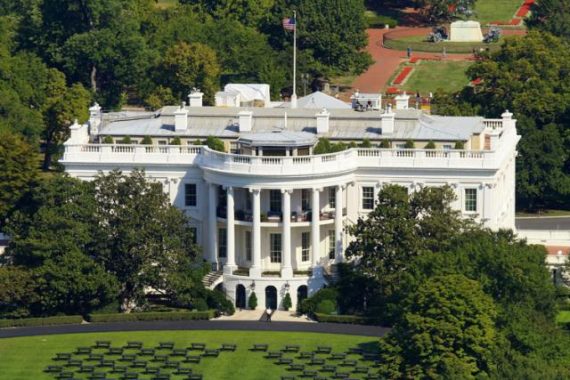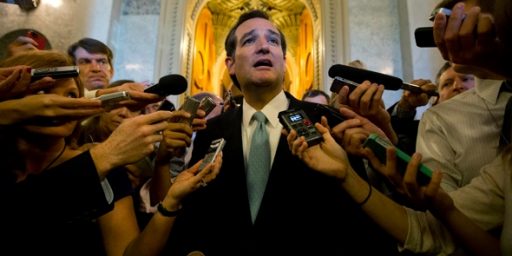It’s Time To Eliminate The Presidency’s ‘Natural Born Citizen’ Requirement
The requirement that the President be a "natural born citizen" is a historical anachronism that has outlived its usefulness or necessity.

Last week, The Volokh Conspiracy published a series of pieces arguing in favor of the idea of amending the Constitution to eliminate the requirement that the President by a “natural born citizen” of the United States. The arguments are all fairly detailed and not really capable of being fairly summarized here, so I’ll just commend them to your attention. The thread consists primarily of posts from University of Richmond Law School Professor Kevin Walsh which can be read here, here, here, and here as well as commentary from Ilya Somin and Eugene Volokh. Each of the posts makes the case for eliminating the requirement that the President be a “natural born citizen,” a requirement that has existed since the Constitution was drafted, and which differs significantly from the requirements necessary to serve in any other branch of government at the Federal or state level. It is, as I argue herein, a rather compelling argument that seems on its face hard to refute.
When the Constitution was drafted, the concern was that men with allegiances to foreign princes, most of whom led nations far more powerful than the newly formed United States of America, would attain positions of power. Because of that, the Constitution required that a member of the House of Representative have been a citizen of the United States for at least seven years, and that a Senator have been a citizen for at least nine years. In the case of the Presidency, only someone actually born in the United States would be considered eligible for the office.
Times have changed significantly since 1789, and the dangers to the United States of a naturalized citizen who could possibly attain the Presidency but for the “natural born citizen” provision are much less than they used to be. Occasionally there have been discussions about the fact that certain candidates who would be ineligible to run for the White House because of this restriction, most recently Arnold Schwarzenegger, although his ultimately failure as Governor of California certainly makes it far less likely that he’d have any future success in politics in California. At this point, a President who was not born in the United States is not a serious threat to the Republic.
In his initial post, Walsh proposes that the relevant provision of Article II that sets forth the necessary qualifications for President be amended as follows:
This coming Friday May 18 marks the 150th anniversary of the first introduction in Congress of a proposed amendment to the Constitution that would excise the “natural born Citizen” presidential eligibility requirement. This 1868 proposal, introduced by Irish-born Congressman William Erigena Robinson (D-NY), provided that Article II, Section 1, Clause 5 be amended so as to read:
“No person except a Citizen of the United States shall be eligible to the Office of President; neither shall any person be eligible to that Office who shall not have attained to the Age of thirty five Years, and been fourteen Years a resident within the United States.”
In strikethrough form:
“No person except
a natural born Citizen, or a Citizen of the United States ,at the time of the Adoption of this Constitution, shall be eligible to the Office of President; neither shall any person be eligible to that Office who shall not have attained to the Age of thirty five Years, and been fourteen Years a resident within the United States.”
Walsh links to a law review article in which he advocates in favor of resurrecting and ratifying this proposed amendment.
As a general idea, it strikes me that Walsh’s proposal is one that makes sense. As I noted above, the “natural born citizen” clause was placed in the Constitution primarily to ensure that someone who may have allegiance to another nation did not rise to become the most powerful individual in the American government. At the time it was drafted, there was a good reason to believe that this was a concern considering the relative weakness of the new nation and the rather obvious interest that the nations of Europe had at the time in the natural resources of the New World. Additionally, the Constitution was drafted at a time before the United States became a nation of immigrants not only from the British Isles but also from mainland Europe, Latin America, and Asia. Over the past two centuries, we’ve seen how immigration has helped to change and strengthen the nation and the eagerness with which immigrants who have become citizens have embraced their new status as Americans. In addition to being unnecessary, the requirement that only someone who was actually born in the United States, or who had at least one parent who was an American citizen at the time that they were born, should be permitted to become President seems unfair and unnecessary. This is especially true considering that such persons are already eligible to become Congressman, Senators, and Federal Judges as well as to serve in various positions in the state and local government. After nearly 230 years, it seems long past time to change the Constitution to allow these people to serve in the highest office in the land if they can manage to win an election.
One could argue, I suppose, that we ought to be careful about opening the Presidency to anyone who is a citizen without regard to how recently they may have acheived that status via naturalization. To address that issue, it might be advisable to be slightly more conservative in how we change the elig
At the same time, though, it seems unwise to open the Presidency to just anyone who happens to have become a naturalized citizen. Rather than eliminating the requirement, it would be better to change it to be more in line with the citizenship rules for Congress, like this perhaps:
No person except one who has been a citizen of the United States for at least twenty years shall be eligible to the office of President of the United States or Vice-President of the United States; neither shall any person be eligible to either of these Offices who shall not have attained to the age of thirty-five years, and been fourteen years a resident within the United States.
In strikethrough form:
No person except
a natural born Citizenone who has been a citizen of the United States for at least twenty years,or a Citizen of the United States, at the time of the Adoption of this Constitution, shall be eligible tothe Office of President; the office of President of the United States or Vice-President of the United States; neither shall any Person be eligible tothat Officeeither of these Offices who shall not have attained to the Age of thirty-five Years, and been fourteen Years a Resident within the United States.
As with the amendment that Walsh proposes, this proposal would eliminate both the “natural born citizen” requirement and the language about persons who were citizens at the time of the adoption of the Constitution, which is an anachronism since the Constitution has been in effect since 1789. Unlike Walsh’s proposed Amendment, this proposal would provide that only someone who has been a citizen for an extended period of time shall be eligible to serve as President. The added language would extent these same requirements to the office of Vice-President, although that is arguably already the case given the fact that the final sentence of the 12th Amendment provides that “ no person constitutionally ineligible to the office of President shall be eligible to that of Vice-President of the United States.” These revisions to the appropriate section of Article II, though, would make that requirement clearer.
The twenty year citizenship requirement is just a proposal, of course, and one could make the case for a somewhat shorter period of time. As noted above, the Constitution presently requires that a Member of Congress have been a citizen for at least seven years, and that a Senator have been a citizen be a citizen for at least nine years. Given that Congressmen and Senators tend to be younger than Presidents at least in their first terms in office, the shorter requirement for citizenship makes sense. For a President, the requirement should be a bit longer. If not twenty years, then perhaps something slightly shorter such as fifteen years, but in any case the change is one that would open the door to the Presidency to a class of people who have been excluded for too long and without good reason.
Realistically speaking, of course, it’s unlikely that a contemporary effort to pass an Amendment such as this would be any more successful that the effort in 1868 was. Given the current antipathy toward immigration among Republicans especially, making the case that non-native Americans should be eligible to be President at some point isn’t one that’s likely to resonate and certainly it’s unlikely to get the support of two-thirds of the members of both houses of Congress. For similar reasons, it seems unlikely at the current time that one could put together a coalition of three-quarters of the states to ratify such an Amendment should it get through Congress. Notwithstanding those difficulties, though, it strikes me that this is an idea that ought to be seriously considered and debated. For the most part, the “natural born citizen” clause has become something of an anachronism. It’s time we got rid of it.






Now what? “Melania in 2024”?
Back in the day, some people decried that Henry Kissinger was also ineligible.
Agreed.
It’s somewhat ironic, as cross-national leadership wasn’t unusual in Europe in the late XVIII century. And remember Hamilton was born in the West Indies? at the time that was a British possession, but never wound up a part of the US.
I agree, though I think other qualifications should hitch a ride in any proposed amendment. Like “having held at least one popularly elected office for at least half its nominal term.”
Yes, such a provision would have prevented Trump from running, but that’s not the sole reason. First, it would prevent other dilettantes from running. Second, while no one can fully prepare for the office of president, people with some political experience in any elected office, should be somewhat less unprepared than those with none. Third, a dilettante with ambitions who runs for, and wins, a pissant office like dogcatcher in Podunk, may realize politics is not their thing.
I’d also favor all other countries opening up their top executive post to naturalized immigrants. Mexico until late last century required not only a natural-born citizen, but one whose grandparents and parents were all natural-born.
@Kathy:
I don’t agree that having held a previous office should be a requirement to be eligible to the Presidency. Notwithstanding Trump, that is an issue that should be decided by the voters.
This is OT, but oh such awesome sauce…
This morning Fox and Friends ran a lower screen chyron that said:
Dennison then immediately (7:33) tweeted:
The only problem is that the Fox Chyron was lie…that’s the exact opposite of what Clapper said…and of course Dennison simply repeated the lie.
Another case where Fox and Friends is telling the POTUS what to do and say.
If you haven’t checked out Clappers comments on Russian interference, you should.
Would we call this the Schwarzenegger Amendment?
I agree. It would simultaneously get rid of the ridiculous notion that US citizens, like children born to military or government employees while they are stationed overseas, are ineligible to run.
@Doug Mataconis:
That’s a yuge thing to notwithstand.
In the 220+ years of presidential elections, there are a few who held no elected office before winning the presidency, like Washington and many of his generation who followed (and that alone gives you a perfect campaigning tool against my idea!).
But preventing a future Trump, and by that I mean someone completely unqualified for the office regardless of party or ideology, should not be left to the voters who elected the present Trump.
@Kathy:
@Doug Mataconis:
Trump had previously held an office.
Oh…wait…he had grabbed a pussy. Never mind.
What problem would this proposal solve?
Some years ago somebody took the usual list of best rated presidents and asked what they had in common. The biggest thing was that aside from the special case of Eisenhower, they’d been career politicians, learning how to get things done while letting everyone have some piece of the pie.
@Doug Mataconis: I’m not sharing your faith in the voters these days but am willing to acknowledge that they’re all we have to decide things.
@Kathy: As much as we’d like to, we can’t prevent a future Trump. There’ve been others a feckless as Trump before and will be after him, too.
Arnold in 2020? Or maybe Martina Navratolova. Or Samantha Bee (if you reduce the citizen time limit),
What problem would it solve?
How about the fact that it unfairly discriminates naturalized citizens even if they have been living in the United States all their lives?
@Kathy:
So why bother with elections at all if you don’t trust the voters?
Trump’s a disaster, but he’s not even the worst American President, several have caused more unnecessary death and destruction than he has – though of course he’s got plenty of time to catch up and pass them; I’d personally put Andrew Jackson as the worst (Trail of Tears, Indian Wars), and Kennedy/Johnson/Nixon (Vietnam War), and Bush Jr. (Iraq War) also did far more harm than Trump has done (with a big ‘so far’ caveat).
And if you do away with voting to choose leaders, the historical record of various other means of appointment are even worse. As Churchill said, Democracy is the worst of all systems, except for all the others.
@Just nutha ignint cracker:
Maybe we can’t. but we can try.
@george:
I will not reductio your absurdum and ask in return “why not let the voters make all decisions?” Instead I’ll say, truthfully, that the US constitution has a few safeguards in addition to checks and balances. Why not add safeguards when it’s warranted?
People need protections against the government, but also against other people.
I’d agree. Why is that butcher on the $20 bill?
I had an argument once with a hard core conservative Republican about this. It probably came up in the context of John McCain being a “natural born citizen”. I made some mention of the grandfather clause, “or a Citizen of the United States, at the time of the Adoption of this Constitution” as necessary, since there were no natural born citizens over 35 available for the first Presidential election. I thought this unremarkable, but to my surprise it started an argument. He was convinced George Washington was a natural born citizen. No amount of explaining that there was no United States when Washington was born, or that he was born a subject of the Crown, made any difference. Nor did asking why the Founders felt a need for this grandfather clause. I finally realized that to him the United States was not a legal and geographic entity existing in space and time, but a warm fuzzy emotional construct, as was George Washington. And in his mind the two were inextricably entwined, end of story. A useful lesson in how some people think.
@gVOR08:
If you really want to mess with this person, tell him Jesus was not a Christian 🙂
@Kathy: Well, Jackson was going to be replaced by Harriet Tubman, but then Obama left and Trump arrived.
When the country can no longer field credible candidates for the presidency, then we can talk about expanding the talent pool… Wait a minute! I think you’ve got a point.
It’s hard enough (aka, next to impossible) to amend the constitution in areas where a change really could be beneficial to the majority of people. This, honestly, feels like a solution to something that’s not really a terribly big problem.
@gVOR08:
Yep, this is quite common when discussing anything having to do with the constitution. My favorite is when you take the time to go find links to court cases supporting your argument, only to get a reply along the lines of “Can’t you read, it’s plain as day? I don’t care what the courts said, it (whatever law they don’t like) is still unconstitutional!!!!”
Can’t the issue be solved by passing a law defining “natural born citizen”? Or perhaps making a naturalized citizen equivalent to a natural born one after, say, 20 years of citizenship?
@Todd:
Hence the famous Onion headline,
Area Man Passionate Defender Of What He Imagines Constitution To Be
@Daryl and his brother Darryl: I don’t know about that but I would definitely go for Swarzeneggar for president.
@Doug Mataconis: Do you really believe that “anyone can grow up to be President” or are you merely offering a hypothetical “problem?”
If you were delivered via C section are you “naturally born?”
@Todd:
The set of naturalized citizens who a) wish to run for president, and b) would be good at it, has to approach the null set. The only example I recall anyone mentioning is Ahnold, who may have briefly met a), but never b).
Until we get our big Supreme Court battle over someone being born by Caesarian Section, I say no.
In vitro fertilization would also be a fine battle, but wouldn’t likely have a decision quoting Macbeth. “Fear not, Macbeth. No man that’s born of woman. Shall e’er have power upon thee.”, or more likely reversed: “Fear not, America, no man that’s not born of woman shall e’ver have power upon thee”.
@pylon: I would definitely go with Arnold, based on his accomplishments and optimism.
@Tyrell:..I would definitely go with Arnold, based on his accomplishments and optimism.
His accomplishments. Like knocking up the housekeeper while he was married to Maria.
What problem is this amendment trying to solve besides being an anachronism? Is ~250 million people an insufficient number to choose a President?
Edit: I see others are wondering the same thing. Doug’s discrimination argument has some merit, but doesn’t seem to matter enough to be any kind of priority.
@Doug Mataconis: I agree. I have known naturalized citizens who truly love and have the best interest of the country at heart, as opposed to some of these natural-born citizens who think everything should be handed to them on a platter because of the purely random act of them being born here.
That said, the amendment will never, EVER pass with the current state of hysteria against anyone not born here.
I can’t think of a single reason to second guess the constitutional authors. There are plenty of men and women who were born of US citizen parents and who were born on US soil from which to choose a POTUS/VEEP. I like Arnold but not enough to change the rules for him. Keep foreign influence out of the most important job on the planet.
@Mister Bluster: Schwarzaneggar – Dwayne Johnson ticket: can’t lose
@Kathy:
Actually I’m not so sure letting voters make all decisions would work out worse. The problem of course is tyranny of the majority (something I am of course quite afraid of personally), but the current way has a tyranny of the rich and powerful, and I’m not sure the end result is any different. The rich and powerful have shown themselves to be on average as short sighted, prejudiced and narrow minded as the majority. The past century or two of representative democracy hasn’t been great for minorities of any kind.
Ideally you’d have laws (and professional civil servants – I’m thinking “Yes Minister” for all its comedy) limiting the tyranny; I suspect they’d do no worse at that then they’ve done limiting the rich and powerful.
And yeah, Trump’s decision to keep Jackson on the $20 is just another of the many horrible things he’s done. I figure its because he thinks its a reminder that there were worse presidents than him (at least so far – he’s bad in very many ways, but until now not a butcher).
@Daryl and his brother Darryl: “Clap on Clap off”
@prsmith:
Precisely the reason this is needed. The Constitution does not say “US soil.” It says “natural born citizen.” I was born overseas, to US citizen parents, who were serving their country. I AM a “natural born citizen,” because I was a citizen at birth.
The idea that all of the children of US military or government parents born overseas are ineligible to obtain the highest elected office in the land simply because they were born outside the US is ridiculous.
The entire reason for this requirement in the Constitution in the first place was the fear of someone with allegiances to a foreign monarchy getting elected; after all, this is what was common at the time. Monarchs married off their offspring to other foreign powers in an effort to expand territory.
THAT is what they were trying to prevent.
People continue to confuse “natural born” with what I refer to as the “magic dirt” construct. You can be a natural born US citizen without having been born in the US.